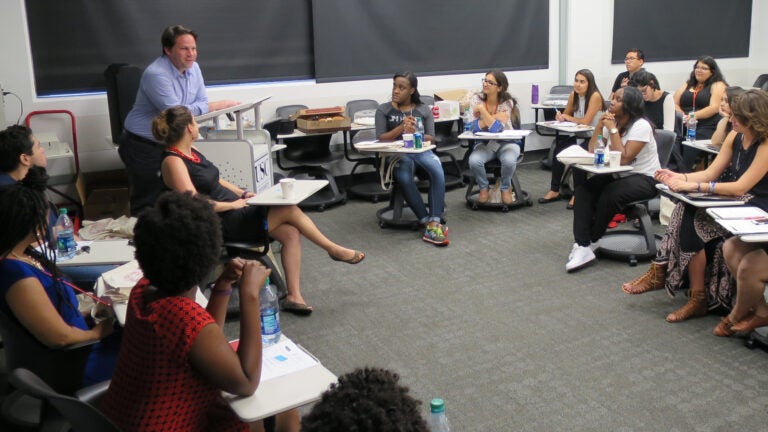
Christian Grose, associate professor of political science, introduces the agenda. (Photo/Yaminah McKessey)
Summer institute helps first-generation and minority students apply for PhD programs
The institute aims to increase the diversity of the applicant pools for top doctorate programs in political science or other social science fields at USC and across the country
The Political Science and International Relations (POIR) PhD program hosted the first POIR Predoctoral Summer Institute for First-Generation and Minority Scholars.
The institute was designed for first-generation and minority undergraduate, master’s or law students thinking about pursuing a doctorate in political science or related fields such as sociology, economics or public policy.
The goal was to bring students from across Southern California together to learn more about these programs and to receive feedback and specific advice on how to craft a successful and competitive application for admission. Five USC Dornsife College of Letters, Arts and Sciences political science faculty members and six current POIR PhD students were on hand to work directly with institute participants.
There were nearly 100 applications for 25 places at the institute. Given the great demand, organizers are aiming to host again. Christian Grose, director of the POIR PhD program and associate professor of political science, spoke about the event.
What problem is this event intended to address and how does it do so?
One of the “wicked problems” in political science and international relations — and many other social sciences — is creating greater access to graduate school for first-generation and minority students. In political science and international relations at all U.S. universities, there is an increasing diversity of undergraduate students majoring in these fields, but less diversity among graduate students and particularly among tenure-track and tenured professors. There are many first-generation and minority students being taught, but very few doing the teaching and conducting the research.
The POIR predoctoral institute is a first step in increasing the diversity of the applicant pools for the best PhD programs in political science across the country, including our program at USC. The institute brought together undergraduate students from many universities in Southern California. Some of the students who participated have few interactions with faculty at research institutions, and one of the institute’s goals was to create new avenues to learn what it takes to get a PhD and succeed in academia. Other student participants have interactions with research-active faculty but could benefit from additional mentorship and networking with other faculty and students, which the institute also provided.
The institute’s ultimate goal is to increase the pipeline of minority and first-generation PhD students and professors. Secondarily, we hope the institute will create an increase in the diversity of the applicant pool for the POIR and other PhD programs at USC. The USC Graduate School generously offered to waive the application fees of any of the students who participated in the institute as part of USC’s new Graduate Initiative for Diversity, Inclusion and Access.
What advantages come from earning a PhD in political science and international relations compared to a bachelor’s or master’s?
A PhD in political science and international relations prepares students to enter academia as professors. The PhD is required in order to conduct research and teach in political science and international relations. Many first-generation undergraduate students are passionate about research and excel in the classroom but are not aware of how to apply to PhD programs. Further, many do not have the mentorship or knowledge to know that a PhD trains them for a career in academia and what to expect if one pursues this career.
What top three things did participants learn to keep in mind when applying for a PhD program in political science?
First, the students learned what goes into an application for a PhD and how their specific research questions and interests can be shaped to fit more broadly into the disciplinary fields and subfields of political science and international relations. Many students have specific questions they want to study but have difficulty figuring out how their research interests both translate into the broader discipline and match with the research interests of faculty at PhD programs to which they are applying.
Second, particularly for those students who are in their junior year or below, we stressed the importance of garnering research opportunities with their own professors at their universities or in other settings. Many were interested in a PhD, but the best way to both learn about the work of a professor as well as to enhance one’s PhD application is to seek out opportunities to conduct original research and to learn directly from research-active faculty.
Third, the students at the institute received specific advice on how to shape and frame their PhD applications. There are many factors that are important when applying for a PhD program, but two important parts of the application are the CV and personal statement. Participants received direct feedback from USC faculty and PhD students on what to include in their CVs and personal statements when they apply for a PhD. In addition, faculty promised to follow up with students as they continue to craft their personal statements for their PhD applications.
